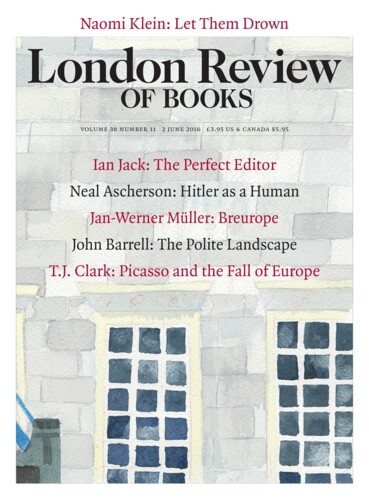– Elvis is dead, the radio said,
where it sat behind a fresh baked loaf of bread
and broken link of kobasc
fetched only lately from Boucherie Hongroise:
Still Life without Blue Pitcher.
I read that piece of meat as if I were Chaim Soutine,
with its capillaries and tiny kernels of fat,
bound up in its burnt sienna casing.
There and then the motif came to me
that would anchor my early masterwork, Opus 113.
No? I’ll hum the first few bars.
The window was small,
and set low on the wall. Little out there to see,
only the legs of pedestrians below the knee.
Captive, a prisoner nearly, inside the ochre room,
as the radio poured forth this terrible news:
– KING ELVIS IS DEAD
his flesh empurpled, the giant gold medallion,
his lolling tongue bitten nearly in two.
I took note, the time was propitious for soup
even amidst the bulletins and updates, and then made ready
with the preliminary slow-mo casting about that attends
the act of creation,
a length of sausage readily at hand.
Soup-making always seemed to settle me back then.
Those with whom I lived considered me vain,
excepting the Lady M,
with whom I tirelessly played,
Parcheesi, Scrabble, less circumscribed games.
She would have bought for me a giant gold medallion
could she have managed the expense,
if only I would let her.
Presently the soup was the colour of the room;
everything around me, the walls, the air,
varying shades of ochre,
but pebbled with paprika-coloured nuggets.
They say he existed on tuinol and cheddar,
his blood turned to sludge,
odds&ends from this snack or that buried deep inside him,
dating all the way back to Blue Hawaii,
the fat around his neck like a collar of boudin blanc.
Every so often he’d soil his white cape,
and only, it turns out, in Vegas and while on stage.
Now, that’s what I call a showman.
Both afternoon and summer were drawing to a close
while the soup thickened on the stove,
the unlit room darkening by degree.
The radio resumed its regular programming,
and, as always seemed the case that hour of the day,
the Gymnopédies by Satie.
Send Letters To:
The Editor
London Review of Books,
28 Little Russell Street
London, WC1A 2HN
letters@lrb.co.uk
Please include name, address, and a telephone number.

